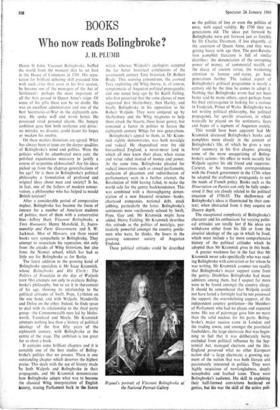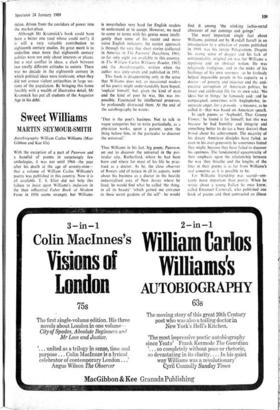Who now reads Bolingbroke ? BOOKS
JAL PLUMB
Henry St John, Viscount Bolingbroke, baffled the world from the moment that he set foot in the House of Commons in 1701. His repu- tation for brilliant debating skill preceded him with such eclat that, even in his first session, he became one of the managers of the Act of Settlement: perhaps the most important of all the Acts passed in Queen Anne's reign. Of some of his gifts there can be no doubt. He was an excellent administrator and one of the ' best Secretaries-at-War in the eighteenth cen- tury. He spoke well and wrote better. He possessed vivid personal charm. His hungry ambition gave him both resilience and drive: no mistake, no disaster, could daunt his hopes or weaken his resolve.
On these matters historians are agreed. What has always been at issue are the deeper qualities of Bolingbroke's mind and politics. Were the policies which he adumbrated mere cant, the polished expediencies necessary to justify a course of serpentine elaboration? Are his ideas picked up from the claptrap generalisations of his age? Or is there in Bolingbroke's political philosophy a formulation of profound and 'original ideas about man and society? Is be, in fact, one of the fathers of modern conser- vatism, a philosopher who has helped to mould British toryism?
After a considerable period of comparative neglect, Bolingbroke has become the focus of interest for a number of American students of politics, most of them with a conservative bias—Jeffrey Hart, Viscount Bolingbroke, a Tory Humanist, Henry Mansfield, Jr, States- manship and Party Government, and S. W. Jackman. Men of Mercury, are three recent books very sympathetic to Bolingbroke. They attempt to resuscitate his reputation, not only from the attacks of Whig historians, but also from the Nattier school, which has had as little use for Bolingbroke as for Burke.
The latest addition to the growing band of Bolingbroke specialists is Mr Isaac Kramnick, whose Bolingbroke and His Circle : The Politics of Nostalgia in the Age of Walpole (our 50s) attempts not only to evaluate Boling- broke's philosophy, but to set it in thotcontext of his age, showing its relationship to the political attitudes of Swift, Pope, Lyttleton on the one hand, and with Walpole, Mandeville and Defoe on the other. Indeed, he finds space to deal with its relationship to the third party group—the Commonwealth men led by Moles- worth, Trenchard and Moyle. Mr Kramnick attempts nothing less than a history of political ideology of the first fifty years of the eighteenth century, with Bolingbroke at the centre of the stage. The ambition is too great for so short a book.
It contains some brilliant chapters and it is certainly one of the best studies of Boling- broke's politics that we possess. There is one outstanding chapter which deserves the highest praise. This deals with the use of history made by both Walpole and Bolingbroke in their propaganda, and Mr Kramnick demonstrates how Bolingbroke adopts what was to become the classical Whig interpretation of English history, tracing Parliament back to the Saxon witan; whereas Walpole's apologists accepted the far better historical conclusions of the seventeenth century Tory historian, Dr Robert Brady. This seeming conundrum, the avowed Tory exploiting old Whig theory, is, of course, symptomatic of Augustan political propaganda; and one noted long ago by Sir Keith Felling, who first perceived that the same classes of men supported first Shaftesbury, then Harley, and finally Bolingbroke in his opposition to Sir Robert Walpole. They were conjured up by Shaftesbury and the Whig magnates to help them attack the Stuarts, these lesser gentry, but remained a factor in politics to harass the eighteenth century Whigs for two generations.
Bolingbroke's appeal to them, as Mr Kram- nick rightly demonstrates, was both nostalgic and radical. He rhapsodised over the old hierarchical England, a never-never land in which all men knew their place, when status and virtue ruled instead of money and power. At the same time, Bolingbroke pleaded for radical innovations such as annual parliaments, exclusion of placemen and redistribution of parliamentary seats in a further attempt, the Revolution of 1688 having failed, to make the world safe for the gentry backwoodsmen. This was combined with a thoroughgoing denun- ciation of a new financial structure—banks, chartered companies, national debt, stock jobbing, particularly the latter. Bolingbroke's sentiments were vociferously echoed by Swift,' Pope, Gay and, Mr Kramnick might have added. Henry Fielding. Mr Kramnick describes this attitude as the politics of nostalgia, par- ticularly powerful amongst the country gentle-- men who were, he thinks, the losers in the growing consumer society of Augustan England.
These political attitudes could be described Rigaud's portrait of Viscount Bolingbroke at the National Portrait Gallery as the politics of loss or even the politics of envy, with equal validity. By 1730 they are
generations old. The ideas put forward by
Bolingbroke were put forward just as forcibly by Dr Charles Davenant, if less elegantly, at the accession of Queen Anne, and they were getting hoary with age then. The post-Revolu- tion pamphlet literature is full of similar diatribes: the denunciation of the corrupting power of money, of commercial wealth, of the decay of ancient virtue, the weakening attention to honour and status, go back generations further. The radical aspect of Bolingbroke's political programme is nearly a century old by the time he comes to adopt it. Nothing that Bolingbroke wrote had not been better said by many others, apart perhaps from his final extravagance in looking for a saviour in Frederick, Prince of Wales. Bolingbroke was not writing political philosophy, but political propaganda for specific situations, in which naturally he played on the sentiments, fears and hopes of a segment of Augustan society.
This would have been apparent had Mr Kramnick discussed Bolingbroke's books and pamphlets more closely in the context of Bolingbroke's life, of which he gives a very brief summary in his first chapter, glossing some of the more unappetising of Boling- broke's actions—his offers to work secretly for Walpole against his old friend and supporter, Carteret, or his treasonable correspondence with the French government in the 1730s when he adapted the craftsman's propaganda to suit the needs of French policy. Books such as the Dissertation on Parties can only be fully under- stood if they are closely related to the political situation of 1730-33. The shallowness of Bolingbroke's ideas is illuminated by their con- text; when abstracted from it they acquire an illusory depth.
The exceptional complexity of Bolingbroke's character and his enthusiasm for varying politi- cal attitudes are totally lost if his ideas are withdrawn either from his life or from the detailed ideology of the age in which he lived, which must include a far more comprehensive history of the political attitudes which he adopted than Mr Kramnick gives in this book.
A greater weakness lies in the fact that Mr Kramnick never asks specifically who was read- ing Bolingbroke with conviction or for whom he was writing. Mr Kramnick assumes too readily that Bolingbroke's major support came from the gentry. Doubtless Bolingbroke had many admirers among them, but I suspect far more were to be found amongst the country clergy. It should be remembered that Walpole could not have lasted a fortnight had he not possessed the support, the overwhelming support, of the independent country gentlemen—the Members of Parliament who had no places and expected none. His use of patronage gave him no more than the solid nucleus for his party. Boling- broke's major success came in London and the trading towns, and amongst the provincial freeholders; the large electorate that was begin- ning to feel that it was deliberately being excluded from political influence by the Sep- tennial Act, managed elections and the like. England possessed what no other European nation did—a large electorate, a growing seg- ment of the nation that was both literate and passionately interested in politics. They were highly suspicious of newfangledness, deeply xenophobic and loathed taxes. These were Bolingbroke's audience. His skill in exploiting their half-formed convictions bordered on genius, but his was the skill of the active poli-
tician, driven from the corridors of power into the market-place.
Although Mr Kramnick's book could have been a better one (and whose could not?), it is still a very valuable contribution to eighteenth century studies. Its great merit is to underline once more that eighteenth century politics were not only about interests or places, but a real conflict in ideas, a clash between two totally different attitudes to society. There was no decade in the eighteenth century in which political ideas were irrelevant, when they did not arouse violent antipathies in large sec- tions of the population. By bringing this home forcibly with a wealth of illustrative detail, Mr Kramnick has put all students of the Augustan Age in his debt.



































 Previous page
Previous page